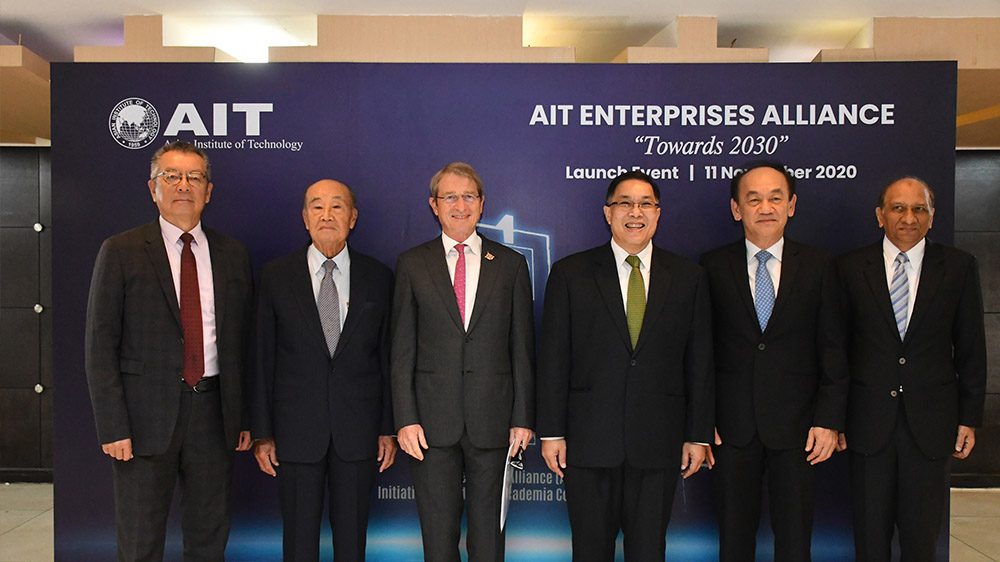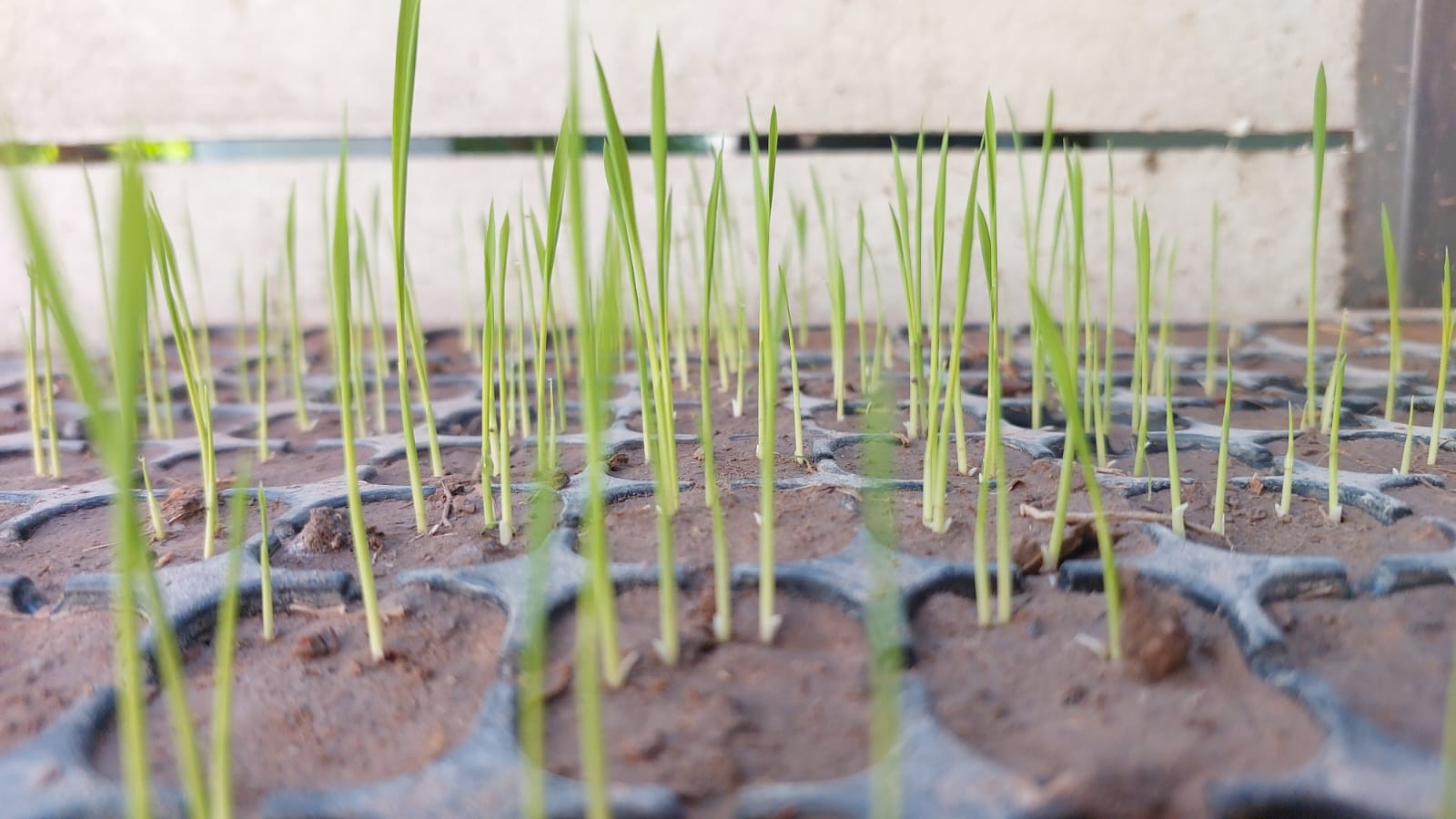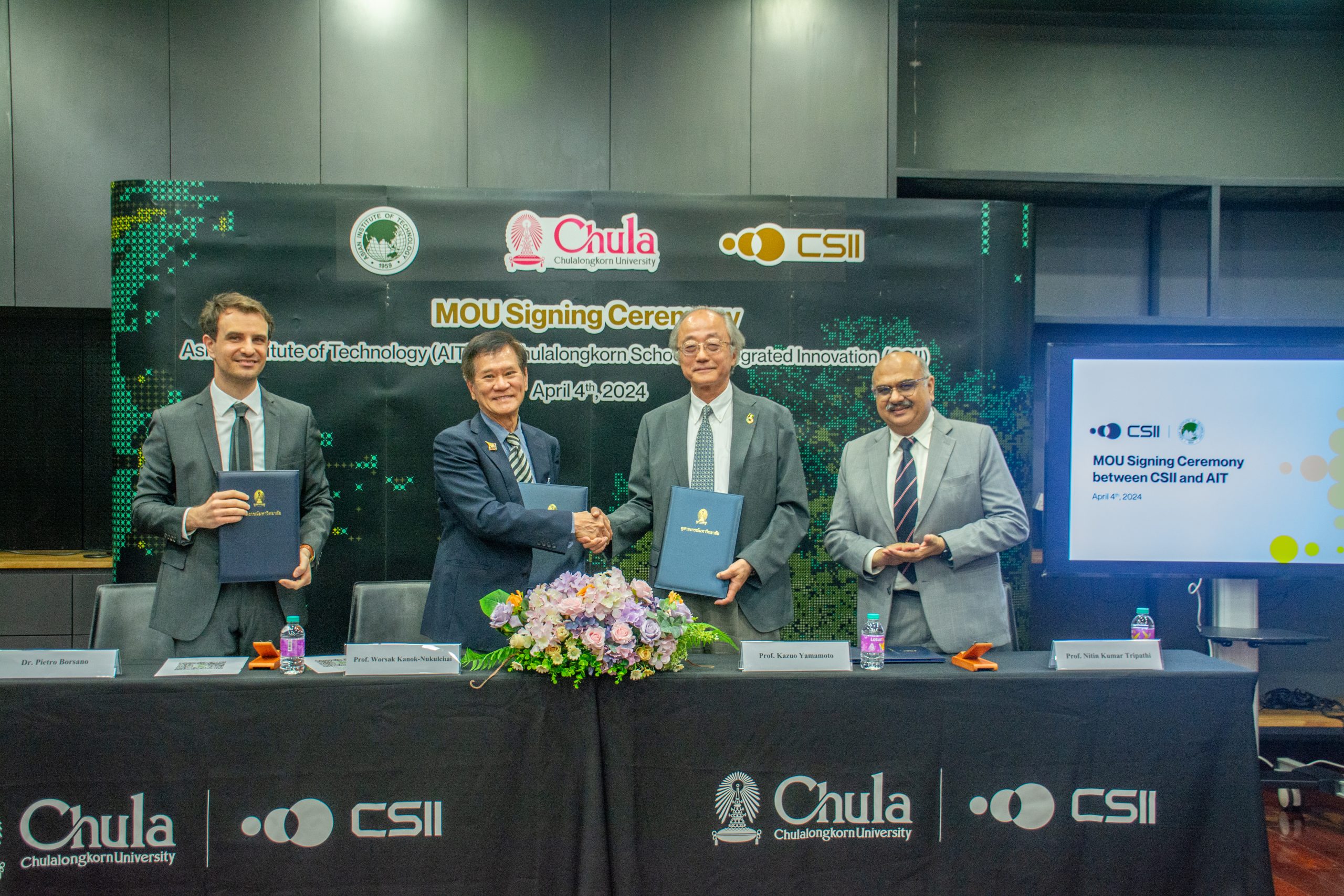By Office of Public Affairs
The AIT Enterprises Alliance (AEA) – an initiative for industry-academia collaboration – came to life officially on 11 November 2020, as leaders of government, industry, and international organizations witnessed its launch online and in person at a special hybrid event organized under the theme “Towards 2030: What the Future Holds.”

Chief Guest H.E Mr. Chutintorn Gongsakdi, Deputy Permanent Secretary of Ministry of Foreign Affairs of Thailand, Dr. h.c Harald Link, Chairman B. Grimm Group and AIT President Dr. Eden Woon took to the stage and activated the Alliance with a symbolic press of a button.
Deputy Permanent Secretary H.E Mr. Chutintorn remarked that he would be working closely with the AIT and that the Royal Thai Government’s support would always be there for the institute, owing to its strong contribution to the country. “Educational institutes partnering with enterprises is a positive development, and I will spread the word about the launch of AEA to the enterprises in Thailand,” he remarked.
Dr. h.c Harald Link headlined the event as the keynote speaker and mentioned that AIT’s commitment to achieving social impact with innovation resonates with B. Grimm’s value of ‘Pioneering Spirit’. In his address titled “Future Energy and its Impact,” Dr. Link outlined a number of key challenges in the energy sector, and energy transitions and trends that will impact the region. He also called for an end to the trade of wildlife, revealing that he has been helping to facilitate the ban on wildlife trade.
In his welcome remarks, President Woon said AIT is a very dynamic institution moving headlong towards 2030, and beyond. Recounting the Institute’s 61 years of success in working for capacity building, sustainability, and social impact, he stressed that AIT must inject innovation into this legacy to go forward. The AEA can foster aspiring and inspiring companies to work with AIT directly and within the new network, he explained.
“The model of social impact with innovation has been embedded in AIT,” President Woon said, adding that the work is now all about transforming AIT and engaging with enterprises much more than before. “We feel that to transform AIT we must fire on all cylinders and achieve goals, and tasks, as outlined in the AIT I2E2S2 strategy, namely: Innovation, Internationalization, Enterprises, Entrepreneurship, Stakeholders and Support.”
AIT Vice President for Knowledge Transfer Dr. Naveed Anwar said the AEA will facilitate bilateral engagement between AIT and enterprises and provide opportunities for multilateral collaborations among the network’s members. He mentioned that the Alliance will serve as a communication and knowledge exchange channel between AIT and Enterprises. The AEA network will foster bilateral engagement between AIT and enterprises, providing opportunities for multilateral collaborations among the network members.
Towards 2030: What the Future Holds
Following the AEA launch, the hybrid audience witnessed a series of panel discussions from a series of outstanding personalities and experts who spoke in person and delivered remarks from abroad.
In the panel “Towards 2030: What the Future Holds,” Ms. Gita Sabharwal, UN Resident Coordinator for Thailand, Dr. Sampan Silapanad, Vice President at Western Digital, and Mr. David Galipeau from SDGx took turns outlining what lies ahead and what needs to be done in the next ten years. Ms. Gita laid out four trends that we need to navigate to advance sustainable development: climate change, next-generation governance, demographic shifts including longevity dividends and rising inequality. Dr. Sampan highlighted the unfolding disruption happening due to technology. He recommended that countries should strengthen their human resources to use the technology, prepare them with soft-skills. Mr. Galipeau posited that in 2030 the common person’s life would be more challenging because of the profound transformations and disruptions that are going to happen. “Due to the impact of automation we could be living in a different society where humans will transfer decision-making to machines,” he remarked.
In the plenary panel “Academia-Industry Alliance: The Common Ground” moderated by AIT Prof. Deepak Sharma featured Mr. Worawat Suvagondha, First Executive Vice President, Head of SCB Academy, Dr. Thitapha Smitinont, Executive Vice President, NSTDA, and Dr. Benno Boer, Chief of Natural Sciences UNESCO, Bangkok.
Prof. Sharma, opened the discussion by asking how academia and industry can identify ‘common ground’ that would act as a catalyst for establishing mutually symbiotic relationships between knowledge creation and transformation – to achieve socially desirable outcomes. Dr. Thitapha mentioned NSTDA has been bridging the gap between academia and industry. “Academic institutions and industries should work more together to bring products or services to market.” Dr. Boer maintained that producing knowledge is the key role of universities, and academia and industry can identify ‘common ground’ that would act as a catalyst for establishing relationships to benefit society. Mr. Worawat highlighted his firm’s partnership with AIT for upskilling and reskilling activities. Prof. Thammarat Koottatep, Professor and Academic Chair (Marine Plastics Abatement Program), provided his perspective on AIT’s success story in commercializing some key technologies.
Mr. Chaiwat Kovavisarach, President and CEO of Bangchak, delivered an afternoon keynote speech titled “Sustainability: Opportunity for Businesses” which highlighted Bangchak’s models for integrating sustainability into its businesses. One of the core values of Bangchak is the pursuit of sustainability, and he suggested that startups should pursue similar approaches that would provide higher market capitalization and do social good.
Other speakers were Mr. Tim Feng President of Deep Dive, who joined online from China, Ms. Jamie Brennan, True Digital Group, and Mr. Nophol Techaphangam from Nornorn. The panelists agreed that businesses today need to embed sustainability into their strategy to be competitive. Sustainability is moving to the center stage for industry, and the current era calls for increased transparency and demand for businesses from stakeholders to do more to tackle the environmental challenges. The experts provided their experiences and perspective into the journey to 2030, opportunities that will be prevalent, and the future models of sustainable initiatives for businesses.
The panel “Technology Innovations Shaping the Future: Adaption by Businesses” was moderated by Prof. Dieter Trau at AIT’s Entrepreneurship Center. Mr. Herbert Hong Bo Chen, COO of Tus-Holdings Co. Ltd, joined the panel online from China and provided the opening remarks with his thoughts on the topic. Dr. Chaiyatorn Limapornvanich, NIA, Dr. Thiti Vacharasintopchai, TEAM Group, Mr. Djoann Fal, Get Links, and Mr. Methee Srisupundit, Siam Kubota, joined the panel in-person. Experts at this panel evaluated the innovations that have changed the way we work and live, and what the future would hold for us with the advances of specific technologies. Some innovations are now in the prototype stage and not yet commercialized, but could cause dramatic changes to the way we live and do businesses in the coming decades, they said.
The panel “Digital Transformation: Pathway for Businesses” held at the AIT Smart Lab was moderated by Dr. Roger Levermore. Speakers were Mr. Tim Edmunds, Woove Services Limited, Mr. Chroong Kanjchapoomi, Siam Gypsum Industry, Mr. Adrian Soe Myint, Village Link, Mr. Spencer Deng, Dorabot Inc., and Mr. Suttipong Kanakakorn, Blockflint. The discussion here focused on how digital transformation is fundamentally challenging and changing, and how businesses can deliver value to stakeholders. Speakers spoke about the cultural transformations happening due to digital pressures on businesses to continually challenge the existing status quo, experiment, and innovate.
Watch a opening session







